Murrieta Hot Springs: The Catskills of Southern California
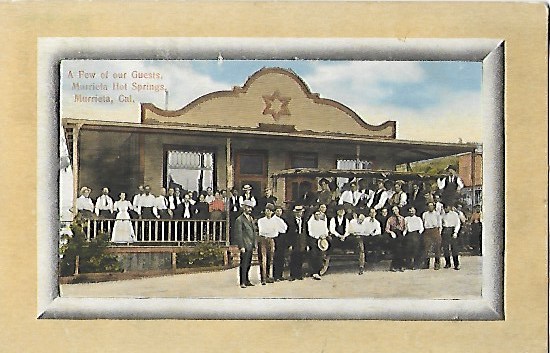
“A Few of Our Guests, Murrieta Hot Springs. Murrieta, Cal.” Postcard dated May 8, 1911. [JMAW postcard collection]
Located in Riverside County, about seventy miles southeast of Los Angeles, the resort was run by Fritz Guenther, a non-Jewish German immigrant who purchased the acreage in 1902 after selling his Los Angeles saloon.
The welcoming atmosphere was enhanced by six-sided stars emblazoned on several of the buildings and cottages. Guenther insisted that the shapes were not meant as Stars of David, but were merely the simplest designs the carpenters could achieve.
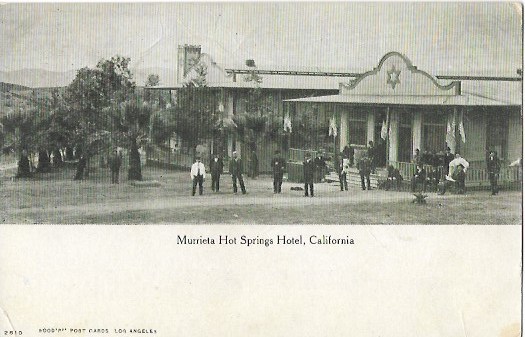
“Murrieta Hot Springs Hotel, California.” Postcard dated January 10, 1908. [JMAW postcard collection]
The resort also offered miniature golf, tennis, swimming, and a host of evening activities, including dancing, cards, pool, and live entertainment—all accompanied by alcohol (even during Prohibition).
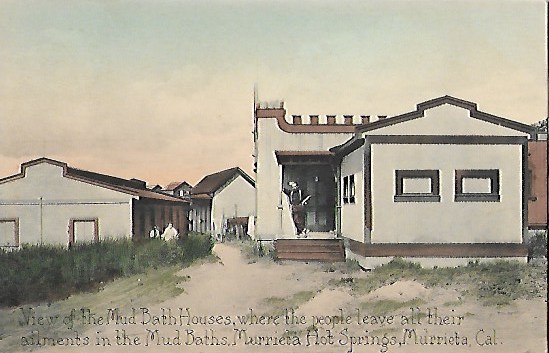
“View of the Mud Bath Houses, where the people leave all their ailments in the Mud Baths. Murrieta Hot Springs, Murrieta, Cal.” Postcard dated November 20, 1910. [JMAW postcard collection]
In New York there are the Catskill Mountains,
Fallsburg and Ferndale keeps you young
But out in California, the land of milk and honya [honey],
The Catskills are too far folg mir a gong [it’s too far for me].
Menschen [people] by the thousands
From New York and far off places,
They go to Murietta
Dortn bakt men op di plaitzes [there they bake their shoulders].
In Murietta, in Murietta,
Ale yidn lebn zich a dort [all the Jews live there].
No duner or bliz [thunder or lightning],
Just itch und shvitz [and sweat].
Dortn shpilt men kortn und shports [there they play cards and sports].
They’re skinny und fet [and fat] there in Murietta.
They come to take a bana [bath] in the mud.
They’re from Chicago and all points east,
It’s hard to say the Easterners are bored.
Folks, the food is wonderful
Right up to their gederem [guts].
I know the food ain’t kosher,
‘Cause zey esn vie chazerem [they eat like pigs].
In Murietta Hot Springs,
Like cowboys without ferd [horses],
Zey lign [they lie] in the mud baths
Mitn kop in drerd [with their head in the earth].
But it come Saturday night
In the dance hall, they’re all there.
Grab your partner Shloimele [diminutive of Solomon]
And we’ll do our Yiddish Sher [Eastern European square dance].
They samba and they mambo
And they shokl [shake] to the rumba
They shokl mit di plaitzes [shake with their shoulders]
And they shokl mitn bumbe [shake their behinds].
There’s beigelech [bagels]
From Sioux City and Seattle by the dozen,
They come to California
And never for a chosen [husband].
They wear bikini bathing suits
Those dainty little things,
Kein ayin hora [no evil eye] such gesunte [healthy types]
They don’t need water wings.
In Murietta Hot Springs
A shidach [match] can be made,
For that’s the place where honeymooners
Go up in the shade.
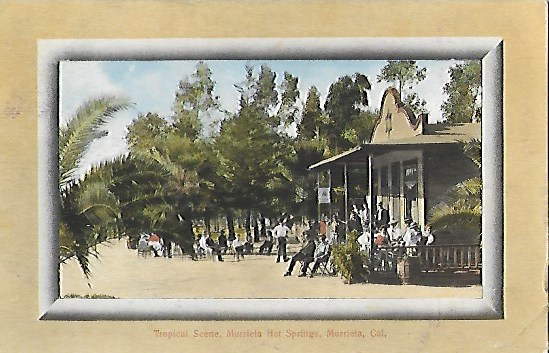
“Tropical Scene, Murrieta Hot Springs, Murrieta, Cal.” Postcard dated March 23, 1911. [JMAW postcard collection]
In 1970, the Guenther family sold the property to businessman Irvin J. Kahn. Morris Shenker, Kahn’s lawyer, later became co-owner.
A mobile home park was built in the hills above the resort, and most of the original residents were Jewish. Congregation B’nai Chaim began meeting there in 1973. The congregation later erected a synagogue on an adjacent lot.
Following Kahn’s untimely death, the resort went through several owners.
From 1983 to 1987, a group called Alive Polarity established a religious commune on the property. Members of the group, most of whom were young professionals, gave up their possessions after a three-year trial period. They lived by a strict code of nonviolence and vegetarianism, and abstained from caffeine, tobacco, television, and telephones.
During the early to mid-1990’s, a popular nightclub called Shakespeare’s Pub and Grill operated from the springs.
In 1995, the property was sold to Calvary Chapel of Costa Mesa, which used it as a Bible college and Christian retreat center.
The property went on the market in early 2021.
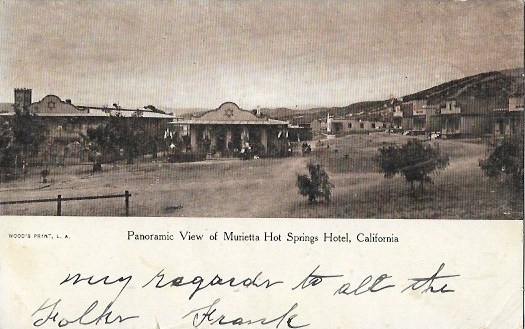
“Panoramic View of Murrieta Hot Springs Hotel, California.” Postcard dated March 19, 1906. [JMAW postcard collection]
Sources
- Loretta Barnett, Marvin Curran, and Tony Guenther, Murrieta Hot Springs (Charleston, SC: Arcadia, 2008).
- “Western Picture Show,” Western States Jewish Historical Quarterly 8/1.
Jonathan Friedmann is curator of this Murrieta Hot Springs exhibit.
